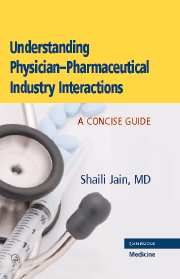Book contents
- Frontmatter
- Contents
- Acknowledgments
- Foreword
- Introduction
- 1 Gifts from the Pharmaceutical Industry to Physicians: Do They Influence your Prescribing?
- 2 Ethical Considerations of Receiving Gifts from the Pharmaceutical Industry
- 3 One on One: An Analysis of the Physician–Pharmaceutical Company Representative (PCR) Detailing Interaction
- 4 Medical Academia and the Pharmaceutical Industry
- 5 Teaching Physicians in Training about Pharmaceutical Industry Promotion
- 6 Continuing Medical Education: How to Separate Continuing Medical Education from Pharmaceutical Industry Promotion
- 7 Professional Policies on Physician–Pharmaceutical Industry Interaction (PPII)
- 8 Preserving Professionalism: Patients' Perceptions of Physicians' Acceptance of Gifts from the Pharmaceutical Industry
- 9 To Sample or Not to Sample? The Use of Pharmaceutical Industry–Supplied Medications in Medical Practice
- 10 Physician–Pharmaceutical Industry Interactions (PPIIs), the Law and the Media
- 11 Direct-to-Consumer Advertising (DTCA)
- 12 Pharmaceutical Industry Interactions with Health Care Professionals: A Global Perspective
- 13 Internet Resources for Teaching about PPII and Independent Sources of Information about Prescription Medicines
- Appendix I
- Appendix II
- Index
- References
Appendix I
Published online by Cambridge University Press: 03 March 2010
- Frontmatter
- Contents
- Acknowledgments
- Foreword
- Introduction
- 1 Gifts from the Pharmaceutical Industry to Physicians: Do They Influence your Prescribing?
- 2 Ethical Considerations of Receiving Gifts from the Pharmaceutical Industry
- 3 One on One: An Analysis of the Physician–Pharmaceutical Company Representative (PCR) Detailing Interaction
- 4 Medical Academia and the Pharmaceutical Industry
- 5 Teaching Physicians in Training about Pharmaceutical Industry Promotion
- 6 Continuing Medical Education: How to Separate Continuing Medical Education from Pharmaceutical Industry Promotion
- 7 Professional Policies on Physician–Pharmaceutical Industry Interaction (PPII)
- 8 Preserving Professionalism: Patients' Perceptions of Physicians' Acceptance of Gifts from the Pharmaceutical Industry
- 9 To Sample or Not to Sample? The Use of Pharmaceutical Industry–Supplied Medications in Medical Practice
- 10 Physician–Pharmaceutical Industry Interactions (PPIIs), the Law and the Media
- 11 Direct-to-Consumer Advertising (DTCA)
- 12 Pharmaceutical Industry Interactions with Health Care Professionals: A Global Perspective
- 13 Internet Resources for Teaching about PPII and Independent Sources of Information about Prescription Medicines
- Appendix I
- Appendix II
- Index
- References
Summary
Over time, many gifts to physicians from pharmaceutical, device and medical equipment industry sales representatives have served an important and beneficial function. For example, industry has provided funds for educational seminars and conferences for many years.
During the late 1980's, however, some of these gifts were becoming lavish, ranging from frequent flier miles to cash and trips to luxury resorts, and their appropriateness was increasingly being called into question. The AMA studied the issue, and in December of 1990, the AMA's House of Delegates adopted CEJA's ethical guidelines to prevent inappropriate gift-giving practices. The AMA's “Guidelines on Gifts to Physicians from Industry” later appeared in its Code of Medical Ethics (CEJA Ethical Opinion 8.061).
The Pharmaceutical Manufacturer's Association (PMA), which later became PhRMA (Pharmaceutical Research and Manufacturers of America), also adopted the guidelines.
Opinion 8.061, “Gifts to Physicians from Industry”
Many gifts given to physicians by companies in the pharmaceutical, device, and medical equipment industries serve an important and socially beneficial function. For example, companies have long provided funds for educational seminars and conferences. However, there has been growing concern about certain gifts from industry to physicians. Some gifts that reflect customary practices of industry may not be consistent with the Principles of Medical Ethics.
- Type
- Chapter
- Information
- Understanding Physician-Pharmaceutical Industry InteractionsA Concise Guide, pp. 71 - 137Publisher: Cambridge University PressPrint publication year: 2007



